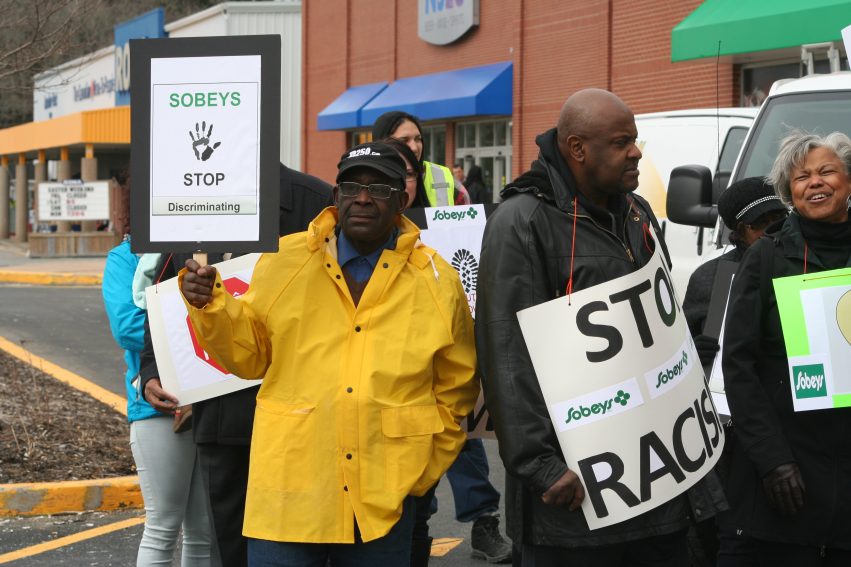KJIPUKTUK (Halifax) – Earlier this month we wrote about a survey questioning all candidates running in the upcoming provincial election about issues that matter to African Nova Scotians.
Questions focused on topics such as environmental racism, North Preston land titles, employment, education, health, child welfare, justice, immigration and reparations.
Only Irvine Carvery, Preston-Dartmouth and Michael McLeod, Halifax-Armdale provided an individual response to the survey, but the three major parties all offered up their answers.

The survey was the initiative of the African Nova Scotian Decade for People of African Descent Coalition, a partnership between the Canadian Association of Black Lawyers, a national organization, and about 20 African Nova Scotian organizations from across the province.
“I am pleased that the three major parties responded, but we would have preferred individual responses from the candidates, that would have been ideal,” says Jalana Lewis, speaking on behalf of the group.
“Overall, the responses that take into account context, that signal that there is an understanding of underlying root causes, are especially appreciated,” says Lewis. “And of course I also prefer the responses that are more likely to lead to direct action.”
Lewis, as one of the organizers of the survey, was reluctant to offer opinions on individual responses.
But to this reporter it appears that the recognition that racism is both a historic and ongoing cause underlying many of the issues is often lacking.
Take the questions about environmental racism. Both the Liberal and PC responses talk about that issue in the past tense, as if it is something that happened a long time ago.
“This power imbalance was pervasive throughout the entire decision-making chain,” writes the PC Party. “In the past many developments that produced and released noxious or hazardous waste into their surrounding environment were in and around some African Nova Scotians and Mik’maq communities,” write the Liberals. (emphasis added).
Yet you only have to look at the uphill battle for remediation of a potentially toxic dump in the Shelburne Black community, or the Mi’kmaw resistance to Alton Gas, to recognize that environmental racism is alive and well today.
Carding, or street checks, is another issue where responses are markedly wishy washy. Except in very vague and general terms is not addressed by the Liberals and PCs at all.
Meanwhile the NDP endorses the current initiative by the Nova Scotia Human Rights Commission to hire an independent expert to research the incidence of street checks by Halifax police.
The NDP does so even though many African Nova Scotians have called for an immediate moratorium on this reprehensible practice. This approach ignores that carding is to a large extent a provincial issue and responsibility, something that is well understood in Ontario for instance. It’s not clear why a progressive provincial government wouldn’t assert its role in ending the practice.
Education is an extremely urgent issue for the Black community, and each year problems in the educational system continue to fester means more kids who drop out of school. Black students are disproportionately suspended, continue to underperform in math and literacy, while funding to address these issues is lacking, the survey intro reminds us.
This is the PC response.
“A Progressive Conservative government wants all children in our education system to have the tools and support they need to achieve their full potential. That means working with teachers and parents to make sure classrooms are welcoming and productive places to learn for all children.”
That’s all. That’s it.
Responses on the issue of reparations suggest there is a long way to go before this notion becomes mainstream.
“The global reparations movement advocates to recognize the wrongs of the past (enslavement, segregation and racial exploitation) including present systemic, institutional, economic, psychological and environmental racism and its effects on Black communities,” the intro to the question states.
In Nova Scotia, and indeed in Canada altogether, this call to recognize the need to repair the consequences and violations of the Atlantic Slave trade and related injustices is a bit of a novel idea. However, in the Caribbean, Britain and even the US the idea is becoming increasingly accepted.
Earlier this year Lynn Jones, Chair of the Nova Scotia Chapter of the Global Afrikan Congress, organized a well-attended community meeting at the Halifax North Memorial Public Library to introduce the idea or reparation and to begin to flesh out what it could look like.
The Liberal response rightfully takes credit for calling the Nova Scotia Home for Coloured Children Restorative Inquiry. But that’s all it has to say on the topic. The other two parties both say they are open to the idea.
There is lots more, and readers are encouraged to read and reflect on all the responses.
Jalana Lewis certainly hopes so. “I see that some of the responses are being shared on Facebook and people are talking about them, and that’s what this survey was all about,” she says.
The survey results are available online at facebook.com/CandidateSurveyANSIssues/
If you can, please support the Nova Scotia Advocate so that it can continue to cover issues such as poverty, racism, exclusion, workers’ rights and the environment in Nova Scotia. A pay wall is not an option since it would exclude many readers who don’t have any disposable income at all. We rely entirely on one-time donations and a tiny but mighty group of kindhearted monthly sustainers.



